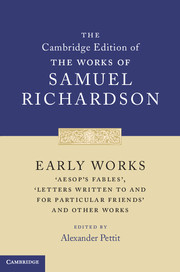Book contents
- Frontmatter
- Dedication
- Contents
- General Editors’ Preface
- Acknowledgements
- Chronology
- List of Abbreviations
- General Introduction
- Textual Introduction
- The Apprentice’s Vade Mecum (1733)
- A Seasonable Examination of the Pleas and Pretensions (1735)
- Preface to Aubin, A Collection of Entertaining Histories and Novels (1739)
- Aesop’s Fables (1739)
- Letters Written to and for Particular Friends (1741)
- Six Original Letters Upon Duelling (1765)
- Appendix: The Infidel Convicted (1731)
- Postscript
- Emendations
- Word-division
- Bibliographical Descriptions of Early Editions
- Explanatory Notes
- Index
Preface
Published online by Cambridge University Press: 30 June 2022
- Frontmatter
- Dedication
- Contents
- General Editors’ Preface
- Acknowledgements
- Chronology
- List of Abbreviations
- General Introduction
- Textual Introduction
- The Apprentice’s Vade Mecum (1733)
- A Seasonable Examination of the Pleas and Pretensions (1735)
- Preface to Aubin, A Collection of Entertaining Histories and Novels (1739)
- Aesop’s Fables (1739)
- Letters Written to and for Particular Friends (1741)
- Six Original Letters Upon Duelling (1765)
- Appendix: The Infidel Convicted (1731)
- Postscript
- Emendations
- Word-division
- Bibliographical Descriptions of Early Editions
- Explanatory Notes
- Index
Summary
The present Depravity of Servants is a general Complaint in the Mouths of all Masters of Families; and it must be allow’d, there is but too much Reason for it. It were easy to assign several Causes to which this Depravity is owing, and, besides the Degeneracy of the Times, and the Prophaneness and Immorality, and even the open Infidelity that is every where propagated with Impunity, something perhaps might be too justly laid at the Door of the Complainants themselves. But as it is not any Part of our present Design to find Faults in the Master, but to endeavour to prevent or reform them in the Servant, who when he comes to be Master, in his Turn, may contribute to amend the Age, we shall refer our selves to the serious Consideration and due Reflection of the former, and apply our selves wholly to the inculcating into the Minds of Youth such salutary Precepts, as we apprehend may have a happy Influence on their future Lives; addressing our selves more particularly to the Class of Young Men who are about being apprenticed out to Trades and Business. This, we conceive, is a Subject that has not been hitherto touch’d upon, or consider’d as it ought: And which yet is of very high Importance to the Good of the Community in this great Trading Kingdom: Since it is from this Source, that the most numerous and most useful Members of the Commonwealth are derived; on whose Industry and Labour the Welfare of the Whole almost intirely depends.
Many excellent Pieces are extant, instructing Men in their general Duties, and the Pulpit every Week joins its important Aid, to explain them, and confirm their Practice. But I know of none that are peculiarly calculated to instruct Young Men in the particular Duties of an Apprentice, or to teach them how to behave in this their first Stage of Manhood and Business, on which the Whole of their future Good generally depends. At most, if there are any such, they contain only general Directions and Exhortations to practise what they were before supposed to be instructed in by their Parents, or such as had the Care of their Education; and so are too often unheeded as Lessons, which they had been already taught.
- Type
- Chapter
- Information
- Early Works'Aesop's Fables', 'Letters Written to and for Particular Friends' and Other Works, pp. 5 - 8Publisher: Cambridge University PressPrint publication year: 2011

